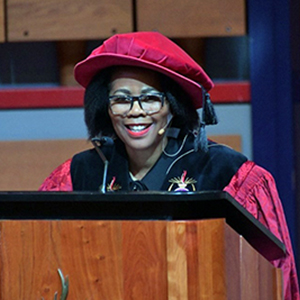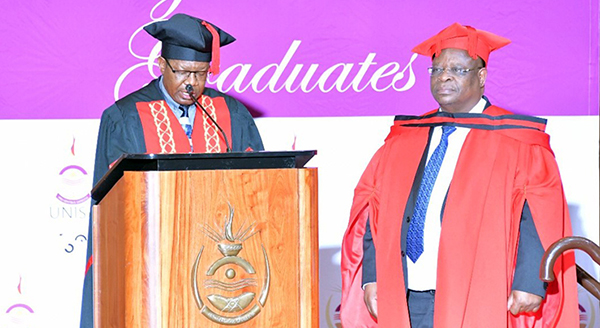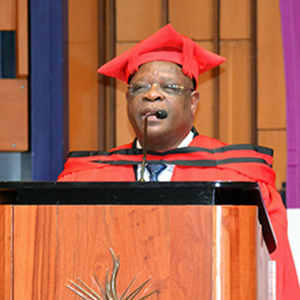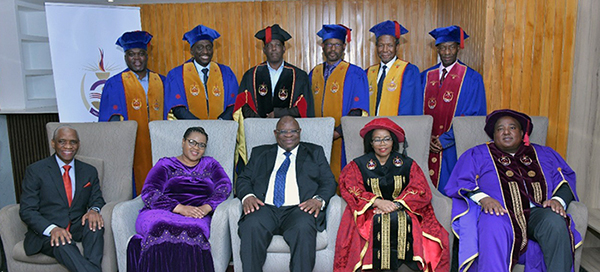College of Law
"I am happy to be associated with this great university" - Chief Justice Zondo

Prof Puleng LenkaBula
During a thrilling #UnisaSpringGraduations ceremony, the university conferred a Doctor of Laws (LLD) (Honoris Causa) on South African Chief Justice, Raymond Zondo, recognising his unwavering commitment to justice. Held at Unisa's Muckleneuk Campus on 27 September 2023, Zondo was accompanied by his family, as well as other government and judiciary dignitaries such as Justice Frans Legodi, retired Judge President of the Mpumalanga Division of the High Court and Justice Bess Nkabinde, retired Constitutional Court Judge.
In her welcoming address, Prof Puleng LenkaBula, Unisa's Principal and Vice-Chancellor (VC), remarked that the ceremony celebrated the success of students and their support structures. LenkaBula appreciated that the ceremony took place during the university's milestone 150th anniversary and in Heritage Month, when the diverse cultures and civilisations of the country are celebrated. "The heritage that Unisa provides in the global arena is ensuring access to quality education and life-long learning through open and distance e-learning," she said.
LenkaBula mentioned that Unisa has produced prominent legal experts, businesspeople, thought leaders, struggle heroes and activists, former statesmen, and acclaimed entertainers and sports stars. She added: "I acknowledge that some of our graduates are the first to graduate in their families." In that regard, LenkaBula said Unisa was proud to partner with families and students who did not allow their livelihood to be determined by the limitations of their backgrounds. Lenkabula further appreciated Zondo's commitment to ensuring a just society.

Prof Olaotse Kole (left) conferring the honorary doctorate on Chief Justice Raymond Zondo (right)
Zondo's impact in the legal field
On behalf of Unisa's Chancellor, His Excellency Thabo Mbeki, Acting Executive Dean of the College of Law, Prof Olaotse Kole, remarked: "The university's core business is to ensure that it produces quality graduates that can add value in society." He congratulated the graduates for their resilience and dedication to their studies and lauded the role of their support structures.

Chief Justice Raymond Zondo
Regarding Zondo's honour, Kole explained that the Unisa Council unanimously decided to confer the honorary doctorate on him for his impact in the legal field. He said: "This honour recognises that Justice Zondo demonstrated ethical leadership in the South African judiciary over decades of selfless service." Kole added: "He also inspires others to follow in his footsteps and commit to ensuring a just and equitable representation of the judiciary to reflect the country's national diversity." He further stated that Zondo was committed to defending and maintaining the judiciary's independence and upholding the Constitution.
Deciding new ways of addressing societal challenges
Receiving his honorary doctorate, Zondo expressed gratitude and remarked: "I obtained my master's degree at Unisa, and I am happy to be associated with this great university." Reiterating the importance of upholding the Constitution and enhancing democracy, he said: "As we approach the end of the third democratic decade, we must reflect on the journey that we have travelled and assess what we have done to improve this country." Zondo said the reflection will assist the country to begin a new chapter in the upcoming fourth democratic decade. "To achieve this, we must identify everything that caused pain and suffering to the citizens, resulting in a lack of development and progress in communities," he stressed. "If what we have done has been ineffective, we must decide on new ways of doing things going forward," he added.

Dignitaries at the #UnisaSpringGraduations and Chief Justice Raymond Zondo's honorary doctorate ceremony
Urgent call to effectively combat GBVF
Turning his attention to gender-based violence and femicide (GBVF), Zondo emphasised: "We need to ensure that the measures we have in place to deal with GBVF are effective." Expressing disappointment about the persisting pandemic despite efforts to combat it, Zondo said GBVF undermined the constitutional rights to safety and security and of human dignity of South African women. He continued: "This scourge has struck havoc and fear, and it impacts women's daily encounters with men."
Zondo argued that GBVF emanates from unequal gender power, manifesting in various forms, such as physical, emotional, psychological, financial and sexual abuse. He said: "It is usually perpetrated by the victims' loved ones and other close people around them." He further argued that norms and traditions performed in patriarchal settings also contribute to the menace. "Additionally," he continued, "males that witnessed abuse in their homes normalise it, which makes it difficult for them to recognise the impact of their actions."
Highlighting the ripple effect that GBVF has on the lesbian, gay, bisexual, transgender, queer, intersex and asexual (LGBTQIA+) community, Zondo said GBV cases were often underreported due to fear, stigmatisation and a lack of confidence in the criminal justice system. Referring to victims who lost their lives to GBVF, Zondo affirmed: "We must honour their memories by working tirelessly for change and committing ourselves to ensuring a safer and better country for women and children." He concluded: "Our freedom is incomplete until women feel safe everywhere."
#Unisa150
* By Nancy Legodi, Acting Senior Journalist, Department of Institutional Advancement
Publish date: 2023/09/28

 Unisa co-hosts G20 community outreach in the Eastern Cape
Unisa co-hosts G20 community outreach in the Eastern Cape
 Unisans gain membership of prestigious science academies
Unisans gain membership of prestigious science academies
 Advocating for disability transformation through servant leadership
Advocating for disability transformation through servant leadership
 Unisa Press continues to illuminate the publishing space
Unisa Press continues to illuminate the publishing space